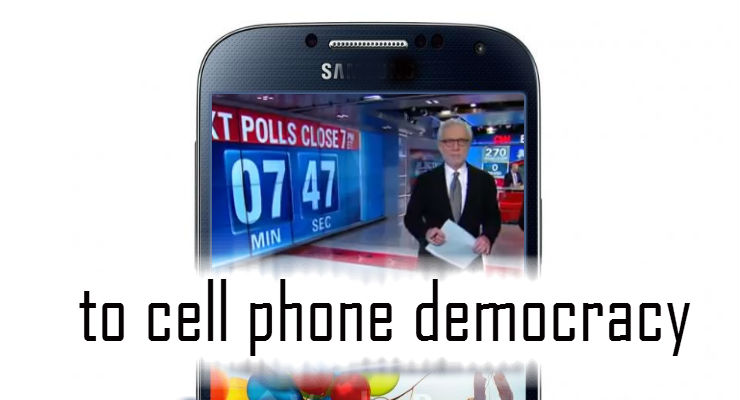
Technology revolution creating a social media-based cell phone democracy where information is king
Democracy, elections and voting at Democracy Chronicles
Pew Research’s latest study, “Cell Phones, Social Media and Campaign 2014” by Aaron Smith, shows that an ongoing transformation of how Americans access the news has continued at an amazing pace since elections two-years ago. The major findings are summed up in its Key Findings:
Cell phones and social media platforms like Facebook and Twitter are playing an increasingly prominent role in how voters get political information and follow election news, according to a new national survey by the Pew Research Center.
The proportion of Americans who use their cell phones to track political news or campaign coverage has doubled compared with the most recent midterm election: 28% of registered voters have used their cell phone in this way during the 2014 campaign, up from 13% in 2010. Further, the number of Americans who follow candidates or other political figures on social media has also risen sharply: 16% of registered voters now do this, up from 6% in 2010.
Voters of all ages are more likely to take part in these behaviors than in the previous midterm race, but that growth has been especially pronounced among 30-49 year olds. Some 40% of voters ages 30-49 have used their cell phone to follow this year’s election campaign (up from 15% in 2010) and 21% follow political figures on social media (up from just 6% in 2010). Voters in this age group now take part in each of these behaviors at rates nearly identical to 18-29 year olds.
Participation in the digital campaign does not have a clear partisan slant. Republicans and Democrats engage in each of these behaviors at similar rates. At the same time, when asked about some reasons why they might follow political figures on social media, Republicans and Republican-leaning independents express a greater desire to be the first to find out about breaking political news, and to say that they use social media to get political information that has not passed through the traditional media “filter.” Voters from both parties place a similar emphasis on the deeper connections that social media allows them to form with the candidates they support.
Digital politics also goes hand in hand with other types of campaign engagement. In particular, the 16% of registered voters who follow political figures on social media participate in various traditional campaign activities at high rates—from volunteering and donating money, to encouraging others to get out and support their preferred candidates and causes.
Leave a Reply